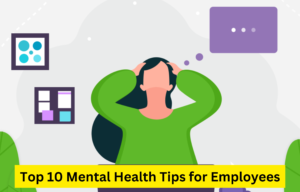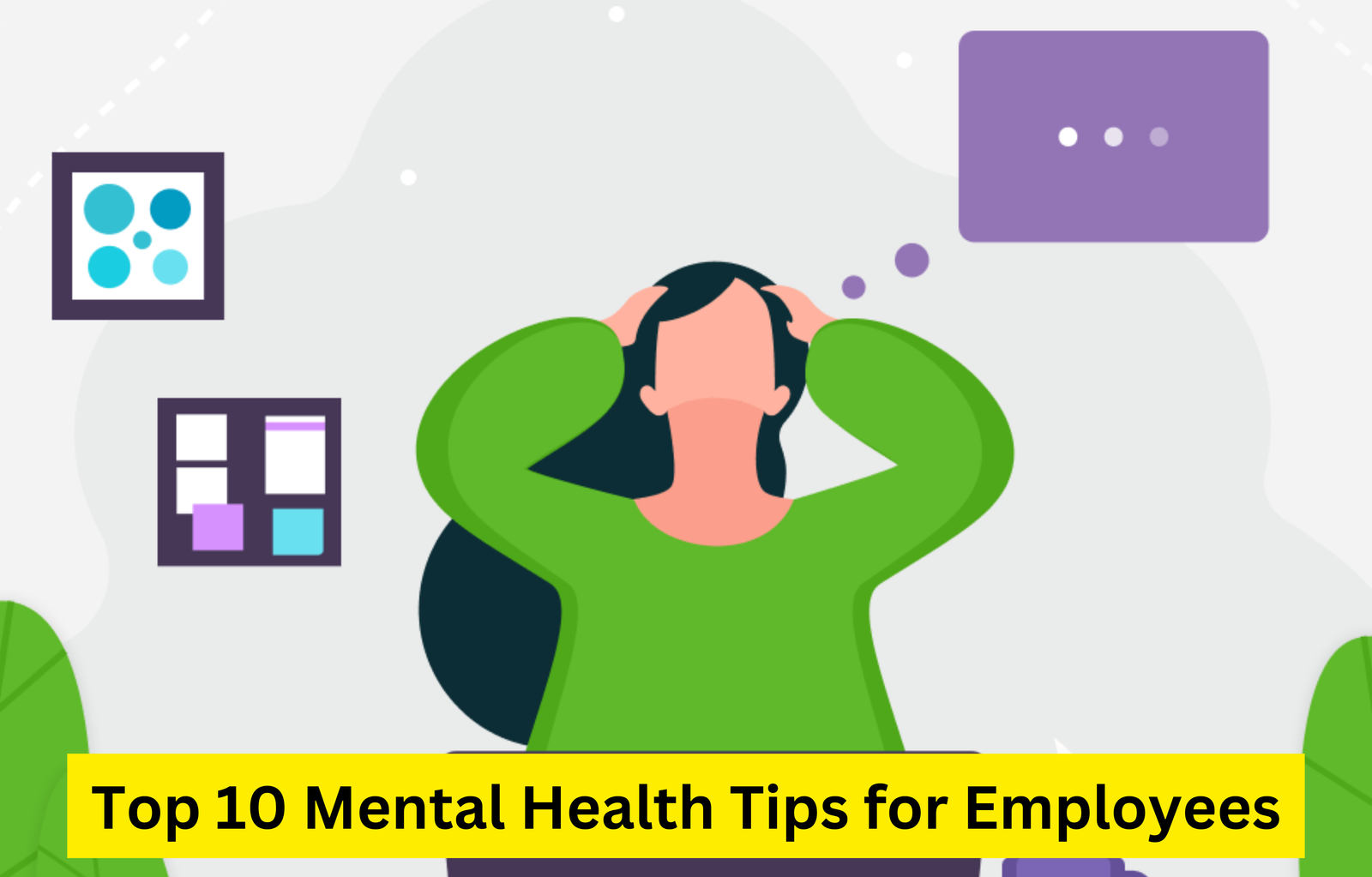Top 10 Mental Health Tips for Employees

Maintaining mental health at work is essential for overall well-being, productivity, and job satisfaction. With increasing work demands, tight deadlines, and often overwhelming pressure, it is more important than ever for employees to prioritize their mental health. Here are ten practical tips to help employees protect and improve their mental well-being at work.
1. Set Clear Boundaries Between Work and Personal Life : Mental Health Tips
One of the most crucial mental health tips for employees is to establish a clear separation between work and personal life. With the rise of remote work, the lines between these two areas can often blur, leading to burnout. Create a routine that signals the start and end of your workday, such as logging off at a specific time, avoiding work emails after hours, and dedicating personal time to hobbies or relaxation.
2. Take Regular Breaks : Mental Health Tips
Taking regular breaks throughout the workday helps to recharge your mind and body. Short breaks improve focus and prevent mental fatigue. A quick walk, a stretch, or simply stepping away from your desk for a few minutes can make a significant difference in your mood and energy levels.
3. Practice Mindfulness and Relaxation Techniques : Mental Health Tips
Mindfulness techniques such as deep breathing, meditation, or yoga can help employees manage stress and anxiety. Practicing mindfulness helps you stay present, reduces worry about the future, and allows you to respond to stressful situations more calmly. Incorporate a few minutes of mindfulness exercises into your daily routine to improve mental clarity and reduce work-related stress.
also read: Mental Health at Work: Why It Matters and How to Support It
4. Stay Organized and Prioritize Tasks : Mental Health Tips
Feeling overwhelmed with a long to-do list can negatively impact mental health. To combat this, try staying organized and prioritizing tasks based on their importance and deadlines. Break larger tasks into smaller, manageable steps and focus on one task at a time. Using tools like to-do lists, calendars, or project management apps can help you stay on top of your responsibilities without feeling overwhelmed.
5. Connect with Colleagues : Mental Health Tips
Social support in the workplace is critical for mental well-being. Building strong connections with colleagues can make the workplace more enjoyable and provide a sense of belonging. Whether through virtual meetings or in-person interactions, make an effort to engage with coworkers, share experiences, and support one another.
also read: Mental Health Awareness: Understanding the Importance of Mental Well-being
6. Communicate Openly with Your Manager : Mental Health Tips
If you’re feeling stressed, overwhelmed, or struggling with your mental health, communicate openly with your manager. A supportive manager can help adjust workloads, provide flexible working arrangements, or offer additional resources. Addressing mental health concerns early on can prevent them from escalating into more severe issues.
7. Take Advantage of Employee Assistance Programs (EAPs) : Mental Health Tips
Many organizations offer Employee Assistance Programs (EAPs) that provide confidential counseling services and resources for mental health support. If your workplace offers this service, take advantage of it when needed. EAPs are designed to help employees navigate personal and professional challenges that may impact their well-being.
8. Maintain a Healthy Work-Life Balance : Mental Health Tips
Striking a balance between work responsibilities and personal life is key to protecting mental health. Ensure that work doesn’t dominate your time and energy. Engage in activities outside of work that bring you joy and relaxation, whether that’s spending time with family, exercising, or pursuing hobbies.
also read: Employers’ Duty to Protect Mental Health of Employee: What the Labour Laws Say in 2024
9. Seek Professional Help if Needed : Mental Health Tips
If you are experiencing persistent stress, anxiety, or depression, it’s essential to seek professional help. Mental health professionals can provide you with the tools and strategies to manage your mental health effectively. Don’t hesitate to reach out for help if you need it—mental health support is just as important as physical health care.
10. Practice Gratitude : Mental Health Tips
Incorporating gratitude into your daily routine can improve your mental outlook and overall happiness. Each day, take a moment to reflect on what you’re thankful for, whether it’s a supportive colleague, a project well-done, or simply having a job you enjoy. Gratitude shifts your focus away from stress and negativity, allowing you to appreciate the positives in your work life.





